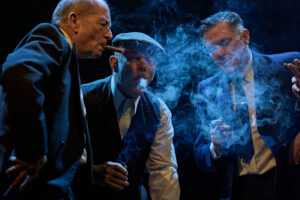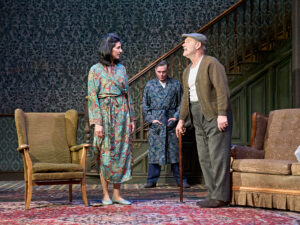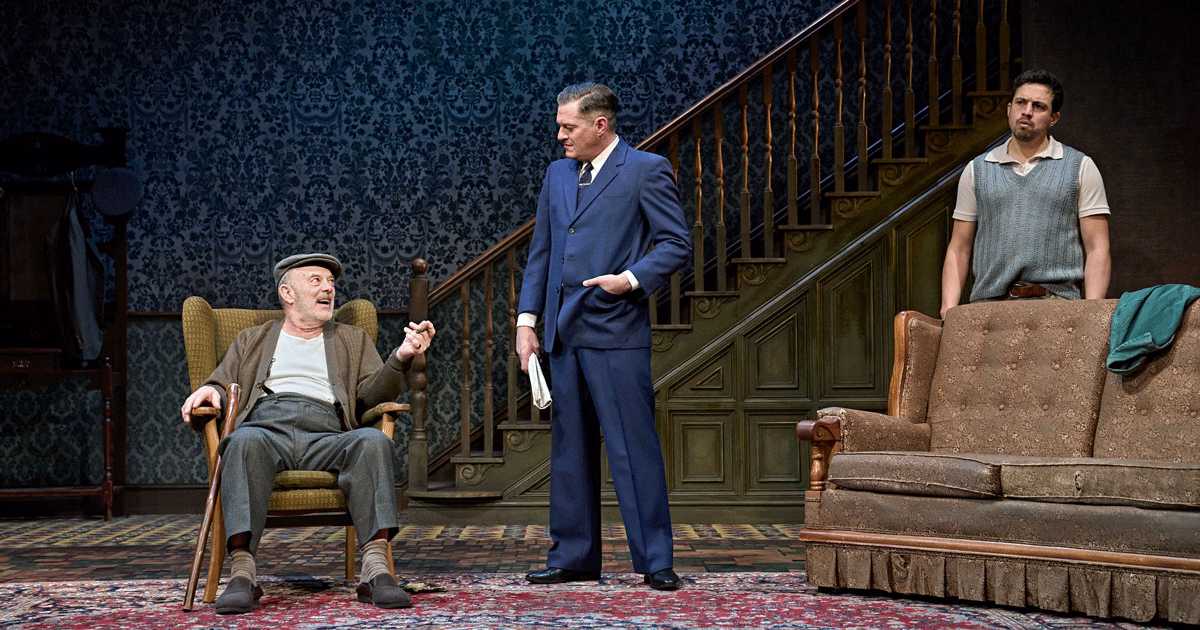A slippery and unsettling Harold Pinter production, Mathew Horne’s performance is the jewel in its crown, says Miriam Balanescu
 The beginnings of The Homecoming, Harold Pinter’s 1965 play, are – to be blunt – fairly banal. An old man, Max (played by My Mad Fat Diary’s Keith Allen), limps across the room in a manner evoking something of Samuel Beckett’s Waiting for Godot, met by a stony silence from Mathew Horne’s Lenny, sat silently reading a newspaper.
The beginnings of The Homecoming, Harold Pinter’s 1965 play, are – to be blunt – fairly banal. An old man, Max (played by My Mad Fat Diary’s Keith Allen), limps across the room in a manner evoking something of Samuel Beckett’s Waiting for Godot, met by a stony silence from Mathew Horne’s Lenny, sat silently reading a newspaper.
This opening montage reveals nothing of the bazaar family dynamics which will later unfold – our only warning the menacing transitions between scenes where family members stand motionless or huddled around smoking while lit by a shock of blue light from above. Their working-class world in North London one of cigars, taxi cabs and horse race betting, it gradually becomes clear that Max is the family’s patriarch, and Lenny his second-eldest son. The tensions between them not yet sizzling, it becomes evident from their conversational rambling concerning gentleman’s pursuits, peppered with expertly executed humour, that their relationship is certainly not run-of-the-mill.
 It’s when Teddy, played by Sam Alexander, arrives home from abroad with his wife, Ruth (Shanaya Rafaat), in tow, that things start heating up. As it transpires, Max and his three sons – also including the dopey boxer, Joey (Geoffrey Lamb) – have long been bereft following the death of their wife and mother – leaving the house womanless long since.
It’s when Teddy, played by Sam Alexander, arrives home from abroad with his wife, Ruth (Shanaya Rafaat), in tow, that things start heating up. As it transpires, Max and his three sons – also including the dopey boxer, Joey (Geoffrey Lamb) – have long been bereft following the death of their wife and mother – leaving the house womanless long since.
This disquieting resurrection of Pinter’s sixties drama sheds new light on its original statements about gender roles, how women gain power and male toxicity. Characteristic of Pinter’s other plays, this is social surrealism at its finest – and most uneasy. With Max regularly proclaiming that he “suffered the pains of childbirth”, the reverence and resentment of women by men – both of the time and in our present day – is laid bare.
Rafaat, despite her little dialogue, masters the transition from prim wife to a paradoxically power-wielding femme fatale. It’s transfixing to watch her dialogic sparring with needy husband Teddy, while Horne, playing a petulant, disturbingly misogynistic son, has the strongest performance in this show by far.
 This production, directed by Jamie Glover, doesn’t always manage Pinter’s long pauses. A strangely uneventful fight scene is painfully dragged out and overlaboured, while the gleeful wringing of awkward social moments elsewhere is to good effect.
This production, directed by Jamie Glover, doesn’t always manage Pinter’s long pauses. A strangely uneventful fight scene is painfully dragged out and overlaboured, while the gleeful wringing of awkward social moments elsewhere is to good effect.
Skilfully slipping from mundanity into the off-kilter social structures of Pinter’s play, a strange landscape that leaves one bewildered, The Homecoming will undoubtedly disturb and delight – hopefully in equal measure.
The Homecoming is showing at the Cambridge Arts Theatre from 11 to 16 April.

